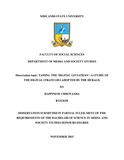Please use this identifier to cite or link to this item:
https://cris.library.msu.ac.zw//handle/11408/4054| Title: | Taming the " digital leviathan" : a study of the digital strategies adopted by the Herald | Authors: | Chikwanha, Happiness | Keywords: | digital leviathan digital strategies The Herald |
Issue Date: | Nov-2015 | Publisher: | Midlands State University | Abstract: | Digital media in Zimbabwe came about at a time media trends were changing the world over as a result of the advent of Information Communication Technologies (ICTs). However, the situation in Zimbabwe was rather unique in that the evolution coincided with a deteriorating socio-political economic situation which resulted in a sizeable population of the country migrating to South Africa, Britain, Australia and the United States among other territories. The media landscape in Zimbabwe was characterized by drastic media laws like the Access to Information and Protection of Privacy Act (AIPPA) among others which resulted in the closure of The Daily News and its sister weekly The Daily News on Sunday in 2003. The Daily Mirror and The Sunday Mirror also closed in 2007 due to financial stress and this resulted in several local journalists going into exile. The situation meant a contracting media landscape in a country where dissenting voices were getting louder against the deteriorating political and economic situation. Thus The Herald subsequently became the more dominant media player, more so as a government propaganda tool. This study therefore explored qualitatively the digital strategies adopted by The Herald in taming the dissenting voices coming through digital alternative channels by way of being a player. The study also looked at user-generated-content (UGC) management techniques deployed by The Herald and the challenges the newspaper faced in the implementation of these and the extent to which readers exercised the power to refuse to be passive. The study employed Habermas’ theory of the Public Sphere and McQuail’s Alternative Media theory in exploring the contestations around exclusion and inclusion of the general public from the media space whilst Gramscian lenses were used to explore the nature of The Herald’s dominance whilst pushing government propaganda. | URI: | http://hdl.handle.net/11408/4054 |
| Appears in Collections: | Bsc Media And Society Studies Honours Degree |
Files in This Item:
| File | Description | Size | Format | |
|---|---|---|---|---|
| HONOURS DISSERTATION.pdf | Full Text | 3.9 MB | Adobe PDF |  View/Open |
Page view(s)
186
checked on Feb 26, 2025
Download(s)
262
checked on Feb 26, 2025
Google ScholarTM
Check
Items in MSUIR are protected by copyright, with all rights reserved, unless otherwise indicated.


